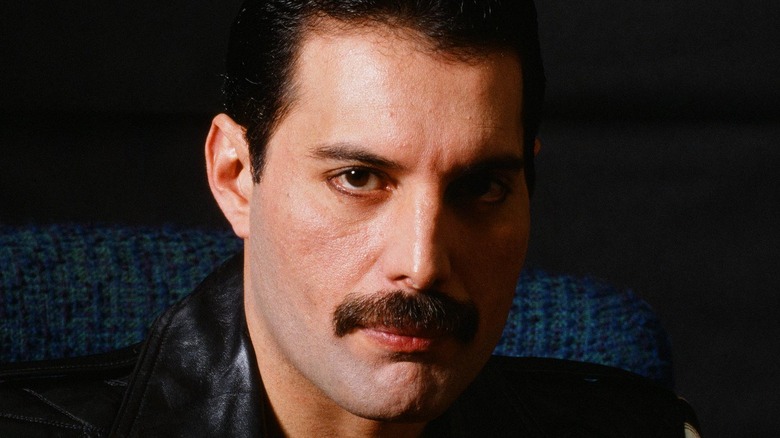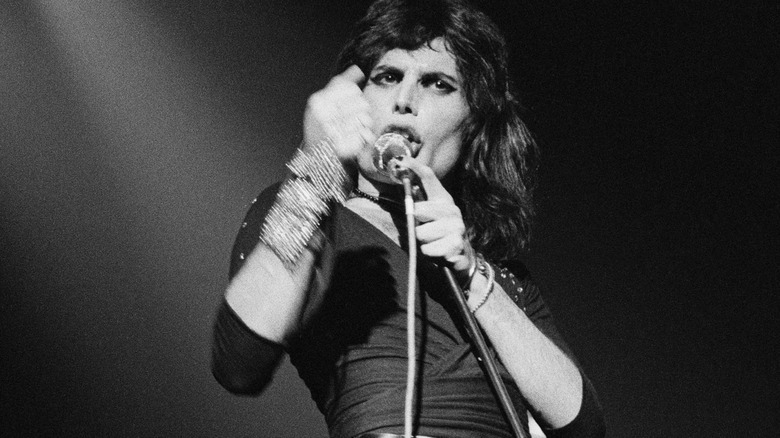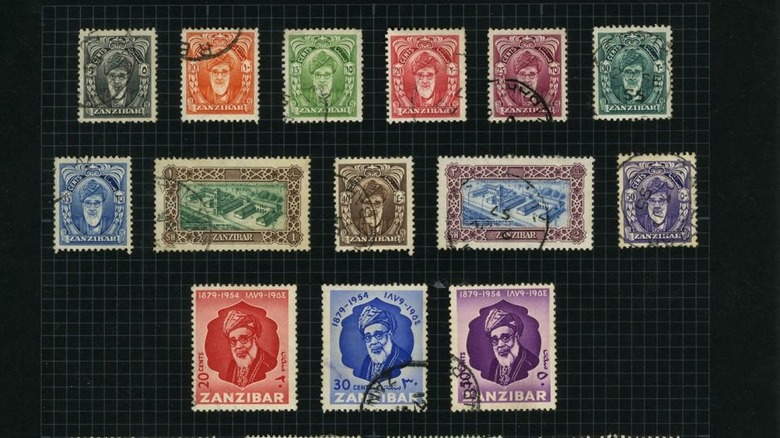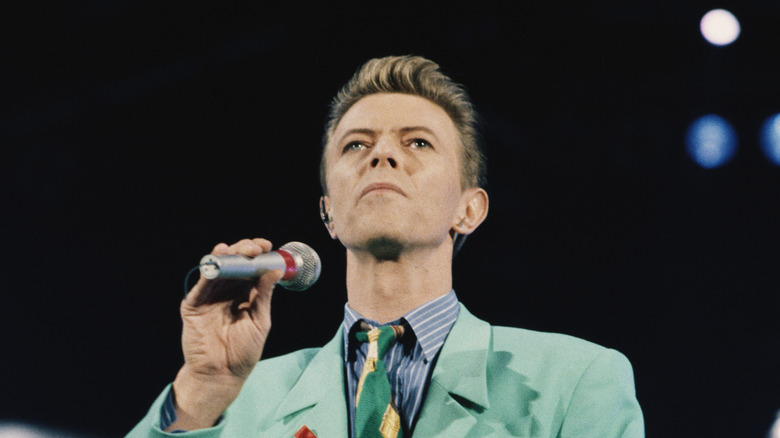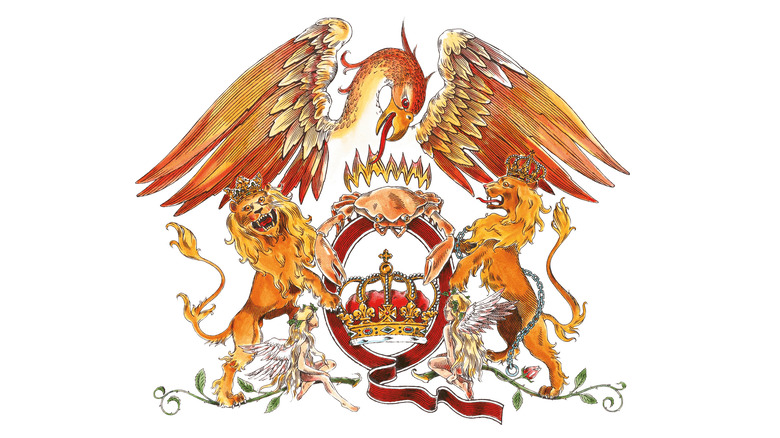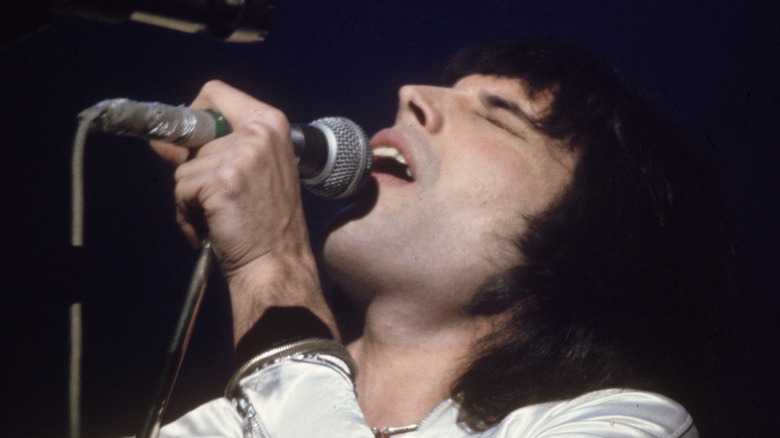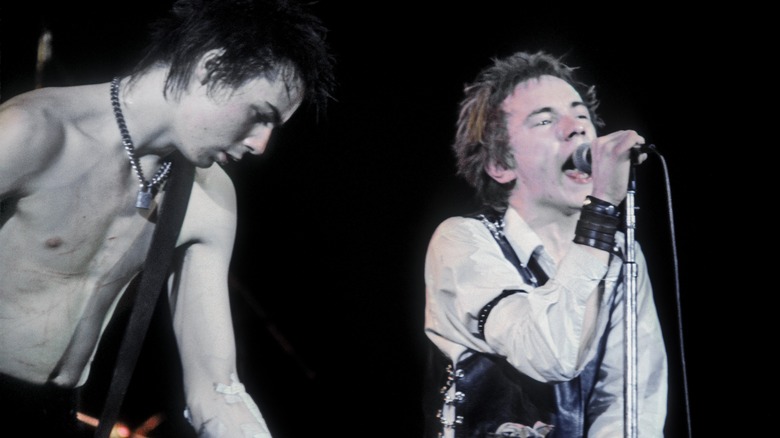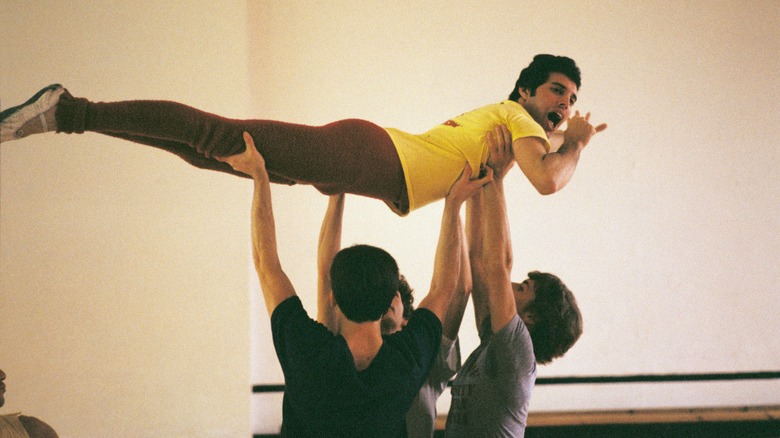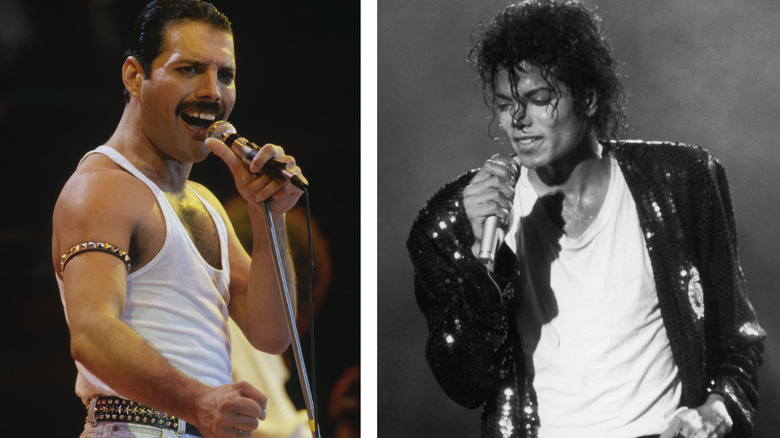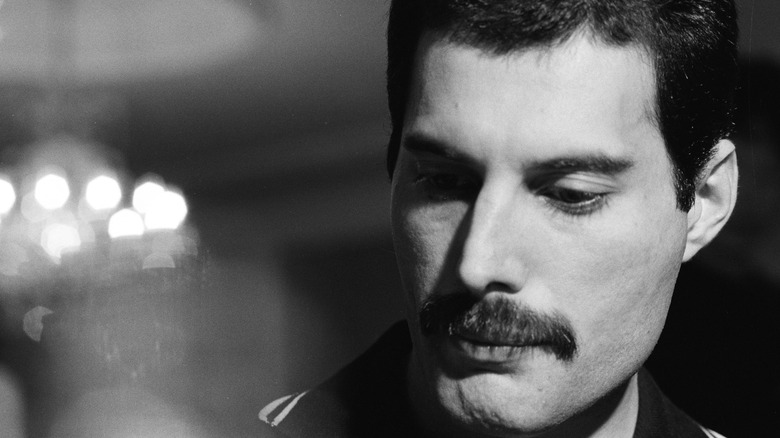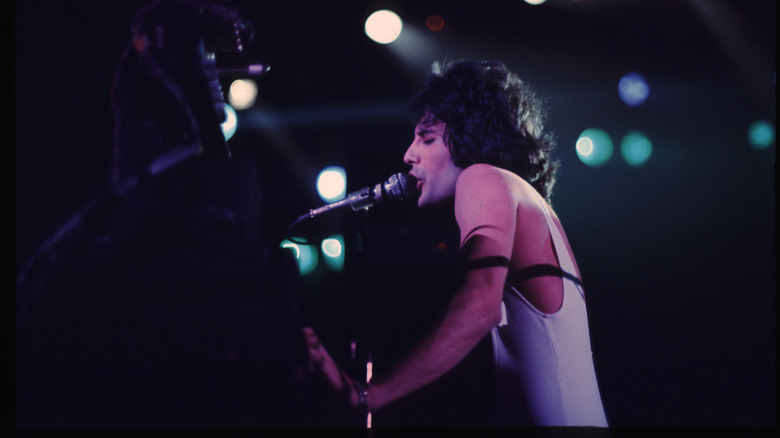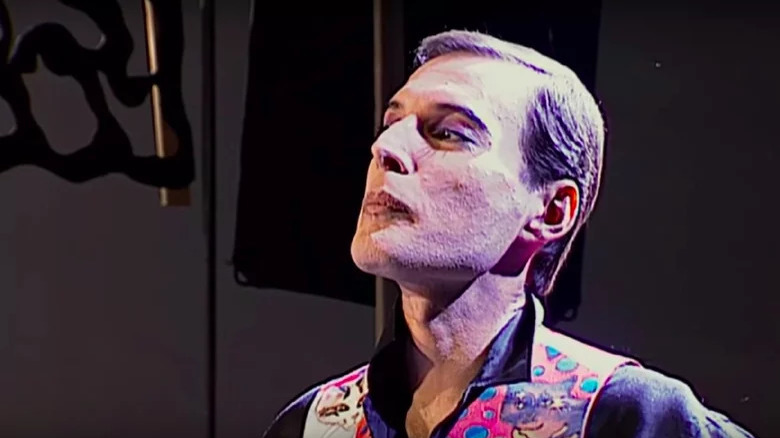The Untold Truth Of Freddie Mercury
Freddie Mercury, armed with untouchable charisma, stage presence, and a mighty, operatic voice, might just be the single greatest frontman to ever pick up a bottomless mic and rock a stadium. The Queen singer, backed up by bassist John Deacon, drummer (and occasional vocalist) Roger Taylor, and guitar legend Brian May, won over millions of fans thanks to instantly recognizable hits like "We Are the Champions," Somebody to Love," "We Will Rock You," and especially "Bohemian Rhapsody." His impact on popular music was so large, in fact, that despite departing the stage for the final time in 1986, he remains a household name and a beloved pop culture icon. Artists who came up alongside Mercury and have continued working in the decades since he tragically died of AIDs in 1991 can only dream of achieving, let alone maintaining, such a status. Hell, Queen itself is still playing, and it all just feels like a Freddie Mercury tribute band (sorry, guys).
Still, there are plenty of Freddie facts even most fans haven't heard of. We've assembled a handful here. If you love Queen (who are we kidding? Of course you do), read on: this is the untold truth of Freddie Mercury.
Freddie's home country no longer exists
Freddie Mercury was born Farrokh Bulsara on September 5, 1946, according to Britannica. His parents Bomi and Jer Bulsara were Parsi. Both his parents had emigrated from their native India to Zanzibar, in Africa, where the future Queen singer was born. Thing is, Zanzibar isn't a place anymore. Or, at least, is no longer a sovereign nation.
Britannica states that the small island, just off the east coast of central Africa, had been a British territory for the first half of the 20th century. In 1963, it became an independent nation (although still part of the British Commonwealth). However, this status was short-lived. In January of the following year, a Communist revolt resulted in the Arabic sultanate being overthrown and a Republic being established in its place. Native Africans, the majority of the population, now ruled the territory themselves for the first time. But this didn't last either. In April of that year, Zanzibar and Tanganyika united, forming the modern nation of Tanzania.
The Bulsaras fled the country when the revolution broke out and resettled in Feltham, England, west of London. There, Mercury finished out his adolescence, attended the Ealing Technical College and School of Art (now part of the University of West London), and later met the other members of what would become Queen.
Freddie Mercury loved collecting stamps as a kid
No offense to any postage stamp enthusiasts who might be reading this article, but bragging about your stamp collection isn't exactly something you'd do on a first date. But at least one undeniably cool person has partaken in the hobby: Freddie Mercury. He wasn't just a casual collector, either. He, of course, went on to do some impressive things in other fields (rumor has it he was quite successful in music), but between the ages of 9 and 12, Britain's Postal Museum says young Farrokh Bulsara had assembled quite a pile of vintage stamps, now visible as a touring exhibit.
Mercury meticulously, but inconsistently, arranged the stamps in his album. On some pages, they're arranged by size. On others, by type, and on still others by color or wording. If he didn't have the right stamp to finish out a certain page's pattern, he'd leave blank spaces on the black sheet. But take even a brief look at his work and you can see why the kid eventually went to art school.
The article suggests that Mercury was likely introduced to stamps by his father, Bomi, also an avid collector. Two years after his son's death in 1991, Bomi auctioned off his and Mercury's collections, which have been seen everywhere from Prague to Australia.
Mercury met David Bowie before either one was famous
Freddie Mercury and glam-rock legend David Bowie first met in 1969, a year before Queen even formed and when Bowie was still struggling to make a name for himself. At the time, according to Rolling Stone, Bowie had been struggling professionally following a series of unsuccessful songs like "Love You Till Tuesday" and "The Laughing Gnome." Still, Mercury, passionate about rock music, was drawn like a magnet to the "Rebel Rebel" rocker when Bowie visited his college to perform a concert. Mercury was fascinated by Bowie, following him around campus and helping however he could. He even helped create a stage of sorts by putting a couple of tables together for the show.
Not too much later, after graduation, Mercury was paying the bills working at a second-hand clothing stall in London. His most famous customer? Bowie, at this point, struggling to follow up his hit single "Space Oddity" and was a little short on cash. In fact, he was so low on cash that he couldn't even afford a pair of used boots. Mercury gave them to him for free.
It all worked out in the end. The song the two recorded together in 1981 (featured on Queen's 1982 album "Hot Space"), "Under Pressure," did well enough to help both guys afford more than a few pairs of boots.
Mercury personally designed Queen's logo
Lots of musicians design their own logos, because you'll need one well before getting a record deal, and unsigned artists aren't exactly swimming in cash to throw at a graphic artist. But most band logos are rather simple. The Rolling Stones have the tongue. Metallica, KISS, and AC/DC just write their names in a certain way. Black Flag and the Red Hot Chili Peppers have iconic, minimalist symbols. Nirvana has a weird smiley face thing.
But Queen was in a different league altogether. Their complex logo resembles a medieval coat of arms with a phoenix, wings spread and serpent-like tongue sticking out, looking down on a letter Q with a jewel-adorned crown in the middle. Surrounding that are representations of the band members' zodiac signs. Guitarist Brian May, a Cancer, has a crab seated atop the Q. Bassist John Deacon and drummer Roger Taylor, both Leos, are represented by roaring lions on either side of the letter, and Virgo Freddie Mercury has two seated fairies beneath those (via Smooth Radio.)
It's a pretty intricate piece of artwork, and Freddie himself drew it. According to Smooth Radio, Mercury's experience at art school gave him the necessary skills to craft the design. To be fair, the original version, as seen on the inner sleeve of the group's debut record, is much simpler than the one you're more familiar with. But still, the guy could sing, write songs, and draw? Leave some talent for the rest of us, dude.
Freddie refused to get his teeth fixed because he thought they helped him sing well
Don't feel ashamed if you look straight at Mercury's teeth every time you see a photo of the guy. He had a monster overbite due to the presence of four extra teeth referred to as mesiodens, according to Millers Music. Mercury was self-conscious about his appearance and often covered up his teeth (maybe that's why he grew that iconic mustache?).
So you might be asking: Why didn't he get some work done? It's not like Freddie Mercury was strapped for cash. He was convinced his extra teeth were also responsible for his magnificent voice because the extra space in his mouth pushed his jaw forward, increasing his range.
Millers Music goes on to detail how unique Mercury's voice really was. The singer was able to shift wildly and quickly between low, mid, and high notes, soaring but never slipping up, always hitting the exact note with laser-guided accuracy. Specifically, it pins his range at around 92.2 Hz to 784 Hz, or F#2 on the low end to a high of G5. For anyone not familiar with music — that's three octaves: extremely impressive!
The verdict is out on what, if any, role Mercury's teeth really played in all of this, but he clearly didn't want to risk his vocal power for cosmetic reasons. After all, he wasn't getting paid for his looks.
Freddie accidentally helped the Sex Pistols get noticed
As Biography points out, there weren't two more different rock bands in 1976 than Queen, superstars riding high off the success of 1975's "A Night at the Opera," and the Sex Pistols, then a little-known punk band looking for a break.
Oddly, it was Mercury who inadvertently gave them the break they needed. The article states that Queen canceled a scheduled December 1 appearance on "Today," hosted by Bill Grundy, due to Mercury's overdue dentist appointment. EMI Records hastily offered to replace Queen with another client of theirs: The Sex Pistols. Out of time, Grundy agreed. You might think it was absurd for a casual talk show to invite the Pistols on for a chat. But at the time, nobody knew what to expect.
In hindsight, it went exactly as well as it should have. Grundy continually pushed the group's buttons, resulting in so many f-bombs and bratty insults being hurled that Daily Mirror ran an issue the next day decrying "The Filth and the Fury" about the interview. This, of course, played right into the Sex Pistols' brand. They, and punk, never looked back. All because of Freddie's teeth cleaning.
It worked out for Queen in the end, though. The same article claims that they were inspired to write two of their most beloved hits -– "We Will Rock You" and "We Are the Champions" -– after listening to the Sex Pistols, who they likely wouldn't have been exposed to without the Grundy incident (via Biography).
Freddie performed at the Royal Ballet in 1979
According to chats between The Royal Ballet vet Wayne Eagling and Laura Jackson, for her book "Freddie Mercury: The Biography," (as detailed in Dangerous Minds), Mercury actually joined Eagling for a charity ballet event in London in 1979. "They asked me," Mercury said. "They actually thought I could dance. So they asked me to do this charity concert."
Thing is, he couldn't really dance. At least, not the tightly choreographed way he needed to for something like this. Turns out stomping across a stage doesn't make someone a natural at a pirouette or plié. With one, you can do what you want and don't need to worry about what your bandmates are doing. In ballet, everyone is locked in together.
"I appreciate their discipline and dedication a hell of a lot," Mercury said. "I mean, it's a different kind of dedication than you have to apply to what I'm doing. I don't think I could ever do it because it's like learning someone else's steps. I do things that I want to do and it's all very free-form."
Still, Mercury brought just enough dedication, energy, and stage presence to the proceedings to hold his own during the performance. In fact, it all went just well enough that Mercury, Eagling, and some other dancers collaborated five years later, in the video for "I Want To Break Free." But that didn't stop bandmate Roger Taylor from describing his buddy's original performance as "brave and hilarious."
Freddie and Michael Jackson didn't have the best time recording together
On paper, it sure seems like a collaboration between one of rock's most beloved lead singers and the King of Pop, both near the peak of their careers, would be a smash hit. But Freddie Mercury and Michael Jackson didn't exactly have a ball when they teamed up to record three duets -– "There Must Be More to Life Than This," "Victory," and "State of Shock" — in 1983.
"They were great songs," Mercury said in "Mercury: An Intimate Biography of Freddie Mercury" (excerpted in Rolling Stone). "But the problem was time, as we were both very busy at that period."
Mercury was clearly trying to be diplomatic. The reality is, that the two singers' working styles clashed in bizarre ways. According to "The Great Pretender" (via The Telegraph), Mercury called his manager at one point and demanded he be pulled out of the studio. " ... I'm recording with a llama," he reportedly said. "Michael's bringing his pet llama into the studio every day and I'm really not used to it and I've had enough and I want to get out."
Jackson had his own problems, especially with Mercury's cocaine use in his house. There are conflicting reports about what the songs were actually for. Whatever it was, it was shelved for decades. The tracks were eventually released in 2014, according to Biography.
Mercury was an introvert
What comes to mind when you think of Freddie Mercury? Probably him in a flashy outfit, storming across the stage, belting out hits, and holding a whole stadium in the palm of his hand. It might surprise you to learn that the superstar was actually an introvert. Friends and family members, as well as others familiar with the off-stage, behind-the-scenes Mercury, described him as shy and thoughtful, rather than loud and boisterous as you might expect.
"He wanted to be as normal as possible," said Mrs. Bulsara, Mercury's mother, according to the Sunday Telegraph (and excerpted in DNA India). "Business was on one side and family on the other. He would come home and say, 'Mum are you making your special cheese biscuits?'" The article continues, saying that even at the height of his fame, Mercury maintained a strong relationship with his family, often asking his mom to cook for his bandmates and crew.
"In real life, nobody knew Freddie," Roger Taylor's letter said of him, according to Mercy and Queen. "He was shy, gentle, and kind. He was never the one he was on the stage."
The same site includes similar quotes from others who knew Mercury personally. Ex-Queen producer Reinhold Mack called him, "unbelievably modest and shy" (two words that pop up repeatedly on the list). Dave Clark of the Dave Clark Five even said, "In his private life he was the real opposite of that provoking star. He was very considerate."
Mercury thought he sucked at piano
You'd be hard-pressed to find a list of greatest rock frontmen that doesn't feature Freddie Mercury at, or near, the top. It's not hard to see why. Between his ability to enrapture a crowd of thousands to that iconic, operatic voice, Mercury's talents spoke for themselves and bordered on magical. The legendary 1985 Live Aid concert is essentially a crash course in how untouchable he was in his prime.
And yet, the man himself was self-conscious about at least one element of his craft: his piano skills. That's rather unfortunate because as Piano Report points out, a lot of the Queen hits Mercury composed and is famous for -– from "Somebody to Love," "Killer Queen," "We Are the Champions," and "Crazy Little Thing Called Love" –- were composed on the piano and actively involve the instrument. In fact, the first few seconds of "Bohemian Rhapsody" contain what just might be the most instantly recognizable string of notes in piano history.
Still, Mercury was shy enough about his skills that, as the Piano Report points out, he frequently had guest musicians fill in on keyboards when Queen played live. It all worked out in the end, though. If Mercury wasn't seated at the piano, that meant he was free to do what he did best: commanding the stage.
Mercury was private about his AIDs diagnosis until the very end
On August 9, 1986, Freddie Mercury led Queen in a thunderous performance at Knebworth Park, closing out their blockbuster Magic Tour. Nobody knew it at the time, but Best Classic Bands says the concert, which took place just over a year after their iconic performance at Live Aid, was the last show Mercury would ever play with the band. A year after that, he was diagnosed with AIDS and effectively became a recluse. "We actually didn't know what was wrong for a very long time," Brian May said. " ... He just told us that he wasn't up to doing tours, and that's as far as it went."
Of course, a man with Mercury's celebrity and presence can't just disappear without anyone noticing. Rumors that he was terminally ill circulated for years, according to the article, especially after he joined his bandmates onstage to accept the award for outstanding contribution to British music at the 1990 Brit Awards. His gaunt, sickly appearance shocked viewers. Still, he kept silent. According to the Independent, the chilling stigma surrounding the disease and the toll the resulting media attention would take on his loved ones heavily influenced his decision not to go public until November 23, 1991.
"Following the enormous conjecture in the press over the last two weeks, I wish to confirm that I have been tested HIV positive and have AIDS," read Mercury's official statement. Within 24 hours, the rock legend was gone.
